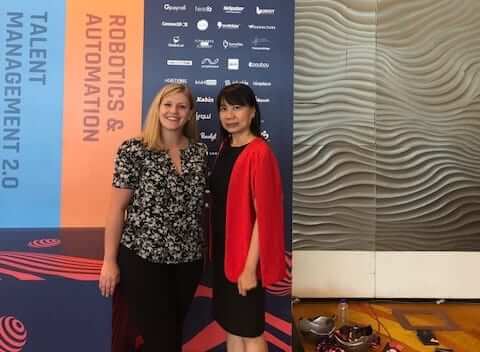(Women on Top in Tech is a series about Women Founders, CEOs, and Leaders in technology. It aims to amplify and bring to the fore diversity in leadership in technology.)
I met Shelley at TechHR Conference 2019 in Marina Bay Sands where it brings together the best of businesses, HR Leaders, HR Product and Service Experts and HR Technology partners and startups from around the globe. She is the Head of Learning and Development at Udemy. She has 14 years of experience in the education sector and in corporate learning and development. Previously, she was VP of Learning & Development at Farside HR Solutions, specializing in talent leadership, management training, and soft skills development for startups. At Udemy, Shelley leads and executes the learning strategy for Udemy employees. She has a master’s degree in Education from the University of Calgary and a bachelor of education from the University of Alberta.
What makes you do what you do?
I am a learning leader at a learning company. I have the complete dream job because I get the opportunity to help drive a company mission forward that’s perfectly aligned with my own: to improve lives through learning. Due to the global nature of our business, with people teaching and learning on Udemy all around the world, I also have the opportunity to witness the impact my work has on a global scale. Udemy empowers people all around the world and there is really nothing better than having a job that allows me to wake up excited everyday and ready to do more to drive our mission forward.
How did you rise in the industry you are in?
I have been incredibly fortunate to be surrounded by fantastic peers and mentors throughout my career. In my first couple of roles in the HR and learning space, I made great relationships and met people who saw potential in me and my abilities. With support from mentors and a strong network, I have had amazing opportunities to challenge myself through new experiences and grow, eventually leading me to Udemy and my dream job.
Did they mention to you what are those potentials they saw in you?
One example that has stuck with me was a conversation I had with a former manager about sharing my voice. We had left a meeting together and I shared some suggestions privately with her that I had around the project we had just been discussing. She instantly stopped me and asked why I had waited until after the meeting to speak up. It was one of the first times that someone sat me down and told me that my voice was valid and that I needed to use it. It changed the way I work, contribute, and even how I think about my team and their voice.
Why did you take on this role in this startup especially since perhaps this is a stretch or challenge for you?
I mentioned earlier how Udemy and I share the same mission of improving lives through learning, but I also get to work alongside fellow employees who love learning as much as I do. My watercooler conversations end up covering topics like assessment frameworks and the neuroscience of learning! Our people not only see the value of learning and development, but they crave it for themselves. I get to be the person who provides that for them.
Beyond that, I also think that Udemy is a place where I have been given freedom to experiment and try new things. As a leading learning company, the expectation is that we deliver best-in-class learning and that’s an incredibly exciting challenge. I always want to push myself to give our employees the best and develop new and innovative initiatives.
Do you have stories of people from remote parts of the world who benefited from Udemy?
One of my favorite parts of my job is hearing the real-world impact we are having on our students, instructors, and business customers. One of my favorite stories is from Mohamad Alaloush, a Syrian refugee, who learned how to program and code on Udemy, ultimately landing a job at a software development company in Berlin. Despite his lack of formal training or on-the-job experience, Mohamad was able to showcase his abilities through the necessary skills for the position. Mohamad is a perfect example that like teachers, the best students aren’t always found in classrooms.
Do you have a mentor that you look up to in your industry or did you look for one and how did that work?
There are so many people throughout my career that I have been really fortunate to have learned from so it’s hard for me to say that I have just one mentor. Most recently, a colleague of mine here at Udemy has been instrumental in helping me uplevel my own abilities. She is always willing to give me very actionable and precise feedback and help me identify areas to develop, as well as areas of strength. She constantly pushes me to grow and improve and at the end of the day, she celebrates my wins and successes alongside me. I know she has my best interests at heart.
Now as a leader, how do you spot, develop, keep, grow and support your talent?
Similarly to how I grew within the learning and development space, I have built my team up with people who can do the job based on their potential and ability, not just the “right” degree. No one on my current team actually comes from a traditional learning and development background; they have all come into space from different areas and have grown and developed within their roles. As we expand our team, I will continue to challenge myself to look at non-traditional backgrounds and consider different approaches. I am also always looking for resumes from teachers that are trying to transition into this field. As a former teacher myself, I strongly believe that a passion for youth learning translates perfectly into adult learning and the skill sets are incredibly complimentary.
Do you unconsciously or consciously support diversity and why?
We consciously support diversity and inclusion here at Udemy. We are dedicated to fostering a culture where everyone is able to contribute to the business and have their impact be valued. We believe this starts with a feeling of belonging. Our internal program UBelong highlights the efforts we have in place to drive diversity, equity, and inclusion, and ensure they connect to belonging.
As one part of our UBelong program, I personally lead an unconscious bias training at Udemy. It is an amazing session for me to facilitate because I am constantly learning and hearing personal stories from employees throughout the business. As part of that training we use virtual reality (VR) and audio clips to virtually place employees into the shoes of others – refugees in Syria, a new immigrant to NYC, female scientists in the arctic, and others. It is an incredible way to talk about the human experience, different experiences, what ties us together, and what is unique to each of us. To me, these stories are at the core of the inclusion conversation. It’s through sharing our story that we ultimately begin to break down the barriers, and connect to one another.
What is your take on what it takes to be a great leader in your industry and as a general rule of thumb?
I believe that as leaders, we must recognize that we are not perfect and acknowledge that there is always room to learn and grow. From there, it is imperative to create those same conditions on our teams and allow our people to have psychological safety and the ability to learn. When you have organizations and teams that allow for growth and development, that accept mistakes, that see people for their potential, we can all continuously improve. Today’s modern technology ecosystem makes it impossible for us to expect people to walk in the door with all the skills they need to be successful. Instead, we must think about hiring for potential and developing our people to learn up and into a new role.
What advice do you have for others?
I would urge people to think differently about how we approach learning in organizations. First and foremost, learning must be democratized across your organization, by which I mean it cannot be reserved only for employees of a certain pay grade or tenure. Learning should be encouraged in everyone and companies should want to have people who are actively interested in growing their skill sets.
Second, training has to be delivered in ways that make sense for busy workers who are used to consuming digital content all the time. That means self-paced, on-demand, and easily accessible no matter where you are or what you are learning. And finally, learners must be empowered to drive their own experiences and given the keys to unlock learning themselves.
If you’d like to get in touch with Shelley Osborne, please feel free to reach out to her on LinkedIn. https://www.linkedin.com/in/shelley-osborne/
To learn more about Udemy, visit https://www.udemy.com/





























